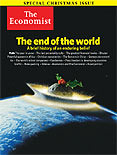This week's
Economist has a cover article on humanity's propensity for conjuring up doomsday scenarios. In the article
A Brief History, the
Economist discusses a number of historial scenarios and antecedents, including such things as the religious underpinnings of apocalyptic scenarios and the recent Raelian phenomenon:
The Raelians' claim to be atheists who belong to the secular world must come as no surprise to Mr Cohn, who has long detected patterns of religious apocalyptic thought in what is supposedly rational, secular belief. He has traced “egalitarian and communistic fantasies” to the ancient-world idea of an ideal state of nature, in which all men are genuinely equal and none is persecuted. As Mr Cohn has put it, “The old religious idiom has been replaced by a secular one, and this tends to obscure what otherwise would be obvious. For it is the simple truth that, stripped of their original supernatural sanction, revolutionary millenarianism and mystical anarchism are with us still.”
The Economist also notes the contributions from political science, including Hegel and Fukuyama:
Hegel saw history as an evolution of ideas that would culminate in the ideal liberal-democratic state. Since liberal democracy satisfies the basic need for recognition that animates political struggle, thought Hegel, its advent heralds a sort of end of history—another suspiciously apocalyptic claim. More recently, Francis Fukuyama has echoed Hegel's theme. Mr Fukuyama began his book, “The End of History”, with a claim that the world had arrived at “the gates of the Promised Land of liberal democracy”. Mr Fukuyama's pulpit oratory suited the spirit of the 1990s, with its transformative “new economy” and free-world triumphs. In the disorientating disconfirmation of September 11th and the coincident stockmarket collapse, however, his religion has lost favour.
And in a refreshing surprise, the article also brings up the contributions of Kurzweil and Moravec:
Noting an exponential acceleration in the pace of technological change, futurologists like Hans Moravec and Ray Kurzweil think the world inhabits the “knee of the curve”—a sort of last-days set of circumstances in which, in the near future, the pace of technological change runs quickly away towards an infinite “singularity” as intelligent machines learn to build themselves. From this point, thinks Mr Moravec, transformative “mind fire” will spread in a flash across the cosmos. Britain's astronomer royal, Sir Martin Rees, relegates Mr Kurzweil and those like him to the “visionary fringe”. But Mr Rees's own darkly apocalyptic book, “Our Final Hour”, outdoes the most colourful of America's televangelists in earthquakes, plagues and other sorts of fire and brimstone.


No comments:
Post a Comment
Note: Only a member of this blog may post a comment.